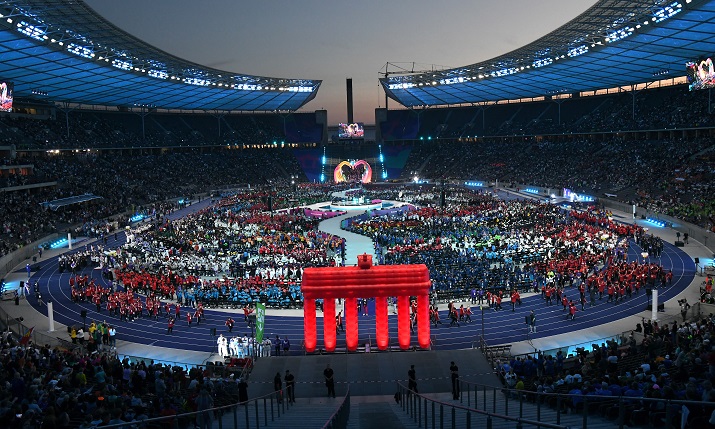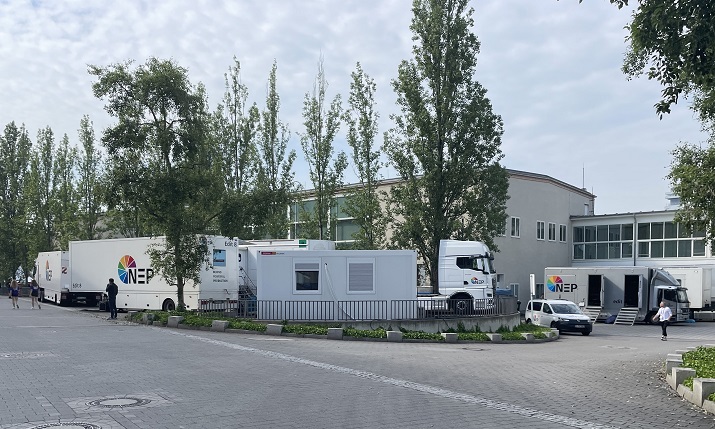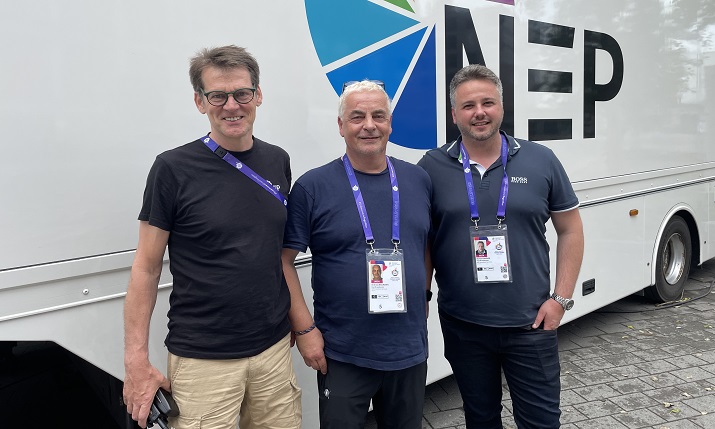Live From: Special Olympics World Games 2023 with NEP Germany

Opening ceremony of the Special Olympics World Games 2023 at the Olympiastadion in Berlin. Credit: Juri Reetz
On Sunday (25 June), the Closing Ceremony of the Special Olympics World Games 2023 marked the end of a very special nine days in Berlin. Over 6,500 athletes from around the world gathered in the German city to take part in a range of sports in celebration of their abilities, and Germany’s broadcasters and media firms were there to capture their stories and share them with the world.
With 26 different sports taking place at eight venues around the city, the Special Olympics was one of the largest sporting events to take place in Germany in recent years.
With the Local Organising Committee (LOC) taking on host broadcaster duties, NEP was selected to provide technical and production services support for the production of around 400 hours of live content which was taken by, among others, ESPN for global distribution and an alliance of 11 media firms including Sky Germany, which also helped with production management and coverage of some events.
One of the starting points for coverage was splitting the events into different categories; platinum, gold, silver and bronze. The closing ceremony was designated ‘platinum’, as was the opening ceremony which featured 20+ cameras, a Spidercamera, augmented reality and more.
Read more Live from Special Olympics World Games 2023: Building a legacy through broadcast
Events designated as ‘gold’ – covered by around 12 cameras – were swimming, athletics and powerlifting, which were the main sports covered by ESPN. The remaining events were split into either silver covered by on average six cameras and bronze, which was typically a single camera SNG crew provided by Sky Germany along with LiveU-equipped teams gathering footage for edited content.
For NEP, that meant supplying 13 trucks – most from NEP Germany, but supplemented with one from NEP Switzerland and two from NEP Belgium – to support the 108050p production of the world feed, with an additional truck for Sky Germany’s own presentation efforts. Some trucks, after they had fulfilled their host broadcast duties, were also shared with ESPN.

NEP trucks on site at the Messe venue in Berlin for the Special Olympics World Games 2023
In terms of people, NEP is managing staff and crew of 310 for the Games, including directors who have been supplied in agreement with the LOC. The creative direction, led by Roman Steuer, is part of the LOC team.
“Our multisport experience is one of the reasons why we are here,” said NEP Germany managing director Zlatan Gavran.
“In addition, NEP can deliver most of the things on our own – there isn’t a need for 10 different OB vendors, so the LOC has one single point of contact. And the second reason is that we are able to provide the same trucks, same kit, same cameras, EVS systems – it’s the same standard whether it’s a six, eight or 12 camera truck.”
Berlin‘s International Trade Fair Messe Berlin was the location for 10 of the 26 sports, as well as the home of the Main Media Centre (MMC) and the International Broadcast Centre (IBC).
Events took place at other venues across the city, with Germany’s MTI Teleport handling signal distribution and all lines from each venue delivered via MTI’s Nimbra-based network to the IBC, which was managed by NEP.
“We discussed in the beginning how we do this best,” said Gavran. “Most of the time you pull kit into the IBC, you rig everything and book an air conditioning room, and so on. But then to save space and for speed, we piped our huge UHD24 truck from there (the compound at the Messe) to here in the IBC, so we are using that truck as a data centre.

NEP Germany team (left to right): Norbert Garske, Andreas Baumann, Zlatan Gavran.
“So when you walk through IBC everything is connected to the truck. It’s easier than pulling flightcases and organising air conditioning, power, and is better for rigging and derigging times.”
It has also helped from a budget perspective, doing away with the need to set up an MCR in the IBC.
NEP Germany head of technical projects Norbert Garske was overall technical project manager, with NEP colleague Andreas Baumann (pictured above) one of the project managers.
“The backbone is UHD24 and up here (in the IBC) we just have workspace all based on the backbone of UHD24,” says Garske, who explained that Germany’s MTI Teleport is handling signal distribution, with all lines from each venue delivered via MTI’s Nimbra-based network.
“I designed the setup last year in Munich for the European Championships, and that was a completely different setup. There, we designed the complete container structure for the for the IBC as well for the TOC.
“Now, we decided that this truck because it’s a very, very strong truck with a huge router we calculated that it matches exactly the need we have to fulfil here. And it’s way faster. We just had one week really in time for the complete setup here.”
The alternative, of equipping the IBC, would have added at last an additional week of rigging time, says Garske.
“That’s because the complete network is already set up. We had some days preparation in Munich because you have to reconfigure some aspects of the router. But we didn’t have to disconnect any devices to get enough input. This router is that strong that we could use the structure on the patch panel to connect everything.”
Sharing content
One of the standout features of these Games has been the cooperation of the media alliance of 11 German broadcasters and media firms, who have been encouraged to share content with the aim of reaching as many viewers as possible.
“We have a fully ingested MAM system on site for all of the takers; we do EVS ingest on site and Mediabank (NEP’s cloud-based media asset management system) in parallel with a third-party system for accessing content, which is the LOC’s Scoopa platform (which provided B-roll, rough cuts, and ready to broadcast reports),” said Gavran.
NEP’s Mediabank with functionality including editing, clipping and conversion was largely used by ESPN and DAZN, while for most of the German takers the more limited functionality of Scoopa sufficed.
Read more Broadcasters gather at Special Olympics World Games for Sky Sport and SVG Europe DACH Summit

